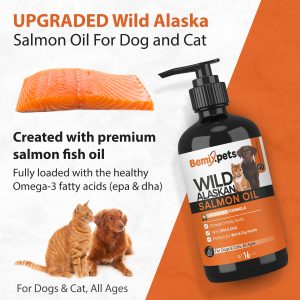There are lots of great treats and foods that you can feed your Golden Retriever. Of course, some individual dogs may have a sensitivity to certain foods. Listen to your dog and see what he does and does not to well eating. Generally speaking, the items listed below can be a great addition to your dog's diet whether as a food or as a snack.
Contents
Meat
Dogs are carnivores so it is no surprise that they can eat meat! The main staple of a dog's diet should be meat. Dogs can consume most meats raw, cooked, freeze-dried, and dehydrated. The most nutrients are available to a dog if you feed meat raw. Free-range, pasture-raised, organic, and animals fed a species-appropriate diet are the best options for meat to feed your dog.
Small Fish
Fish can be great to feed your dog. Small fish are best because they typically have sell contamination. Choose from anchovies, mackerel, and sardines. If you feed canned fish try to find fish with little to no added salt. These small fish are an excellent source of omega-3 fatty acids. You can also feed sardines raw if you purchase them from a seller that is selling them to be consumed raw. Choose wild-caught fish from the Atlantic ocean for best results.
Organ Meat
Think of organ meats as a doggie multi-vitamin. Organs are full of vitamins, minerals, nutrients needed to help your dog thrive. Feeding organs raw will preserve the most nutrients and be the best for your dog. Feed as much variety of organs as possible. Choose from liver, heart, tongue, kidney, lungs, pancreas, eyes, spleen, tripe, brain, and glands.
In traditional Chinese medicine, they say that "like-cures-like." This makes good sense especially when thinking about feeding organ meat. Perhaps your dog is prone to pancreatitis. Well, feeding him some raw pancreas will do two things. First, it will provide your dog with pancreatic enzymes to ease the load of your dog's pancreas. Second, it will provide the pancreas with the nutrients it needs to work better. In general, the pancreas of a dog is going to need a lot of the same nutrients as the pancreas of a goat. Thus, if the dog eats raw pancreas it will provide him with many of those nutrients.
The same is true when feeding any organ to your dog. Feeding a variety of organs will also help to prevent your dog's organs from becoming compromised. Feed as many organs as you can from as many different animals as you can find. It is especially important to feed organs form animals that are ethically-raised, organic, and fed a species-appropriate diet.
This is because a lot of the organs are responsible for filtering toxins out of the body. If the animal is fed a poor diet and lives in a toxic environment, odds are good that when your dog consumes these animal's organs they will be consuming toxins too. If the animal whose organs your dog eats are raised with fewer toxins your dog will consume fewer toxins.
Raw Bones
Yum! Your dog will love eating raw bones. There are two types of raw bones to be aware of. First, we have raw meaty bones these are bones that your dog can consume entierly. These bones provide your dog with calcium and phosphorus in the proper proportions. Second, we have recreational bones. These are going to be bones that your dog cannot consume all of. Typically these are weight-bearing bones, think femurs and pelvic bones. Recreational bones provide your dog with mental and physical stimulation. Choose bones from animals that are pasture-raised and fed a species-appropriate diet.
Skin, Fur, Feathers
While this may seem odd, feeding your dog skin, fur and feathers is a great idea. Remember the "like-cures-like" we talked about earlier? Well, it's not just true for organ meat it's true with feeding skin and fur too. If your dog suffers terribly with skin issues try adding some skin into his diet. To be clear I am not referring to rawhide! I'm talking about feeding your dog raw skin. Like chicken skin, duck skin, turkey skin, or other raw animal skin. Fur and feathers can provide good fiber to your dog too and help to nourish his fur. Be sure to get skin, fur, and feathers from animals that are ethically-raised and fed a species-appropriate diet.
Eggs
Eggs are an excellent food for your dog. They contain one of the most complete amino acid profiles that we know of. Amino acids are the building block of all life. From muscle to hormones amino acids are involved in every part of the body. Eggs can be served raw or cooked. Remeber raw is going to provide the most nutrients. It's best to feed yolk and white together, you can even feed the shell if you want. Be sure to source eggs that are organic and pasture-raise.
Greens and Vegetables
Greens are particularly healthful for dogs. Though plant matter shouldn't take up more than 10% of a dog's diet. Dandelion greens and alfalfa can be particularly healthful for dogs. Be sure to buy them organic. Choose mostly greens with a few low glycemic veggies. These could include, celery, green beans, and Brussels sprouts. Do not feed potatoes or sweet potatoes. Dogs can have a hard time digesting plant mater. So it is a good idea to either slightly steam the veggies or puree them so your dog can gain the most benefit from them.
Berries and Fruit
Fruits and berries can be a good addition to your dog's diet. Be sure to not feed too many, however. Fruit can be very high-carb which is not ideal for dogs. Berries are especially high in antioxidants and can help your dog to thrive.
Fermented Foods
Fermented foods are a great addition to your dog's diet because they are full of probiotics. Probiotics mostly live in the gut, though they are just about everywhere on and in you and your dog! The more good probiotics that live in the gut the better the immune system will be. Feeding fermented foods will boost the good guys, the immune system, and your dog's health. Choose from foods like kimchi, kavass, kefir, water kefir, yogurt, fermented broths, fermented meats, raw milk, and raw goat milk. Be sure to get high-quality organic fermented foods.
Bone Broth
This is like chicken soup for a sick dog. Typically even is a dog is sick and won't eat, they will lap up some bone broth. But bone broth isn't just for skin dogs. You can feed it to your dog anytime! Bone broth is great because it is full of gelatin, glucosamine, and minerals. It can be a great addition if your dog has joint pain or if you want to prevent joint issues. Chose bone broth that is made from ethically-raised animals fed a species-appropriate diet if possible.
Garlic and Herbs
You have probably heard that feeding a dog garlic can be dangerous and bad for your dog. Well, this is true. When you feed your dog the wrong type of garlic or too much garlic it is bad for your dog! However, garlic can be an excellent food/medicine for your dog. Some benefits of garlic include anti-parasitic, anti-biotic, anti-fungal, anti-tumor, and anti-cancer! That's only a few benefits. Choose fresh, raw, organic, USA grown garlic (not the pre-miced stuff).
Dogs can also benefit from many herbs and spices. Parsley is a great detoxifier. Turmeric is a wonderful anti-inflammatory food. Basil can help with arthritis and tick-borne illnesses. The list goes on! Be sure to choose organic herbs and spices.
Dairy
Dairy, yum! Most dogs love dairy, though some can suffer from intolerances. In most cases feeding a dog with a dairy intolerance, raw milk will solve the issue. Extra points if you feed fermented or cultured raw dairy like yogurt, kefir, or raw fermented cheeses. This will provide your dog with more probiotics for a healthy immune system. It's best to feed full-fat, ethically-raised, species-appropriate diet-fed dairy.
Goat Milk
If your dog has a dairy intolerance, try goat milk and goat milk products! Raw goat milk is best. Again, extra bonus points if you feed raw fermented goat milk. Goat milk provides many amino acids, enzymes, probiotics, essential fatty acids, trace minerals, and vitamins. Choose full-fat milk from goats fed a species-appropriate diet.
Fat
Fat is a wonderful energy source for dogs. It is an important nutrient and is used in almost every process in the body. There are even fat-soluble vitamins that require fat for your dog to be able to use them. Fat is the second most important nutrient to your dog after protein. Feeding too much fat has been linked with pancreatitis in some dogs. However, others are finding that a high-fat diet is helping with many health problems. A higher-fat diet with little-no carbs is helping to heal dogs with cancers and other health issues. Fat is also a great energy source for canine athletes. Providing them with sustained energy. The best fats are from animal sources, well-marbled meat, beef tallow, duck fat, animal skin, these are excellent fats for dogs. Also, small fatty fish as discussed above is a great addition to the diet for fat content! Choose fats from ethically-raised animals, fed a species-appropriate diet when possible.
Summary
These are not the only foods that a dog can eat but they are all great for dogs! Adding in a few of these foods to your Golden Retriever's diet can provide many health benefits and prevent health issues. Pay attention to what you Golden Retriever likes and does well on, and what he doesn't do as well on, and he will thrive!






Leave a Reply
You must be logged in to post a comment.